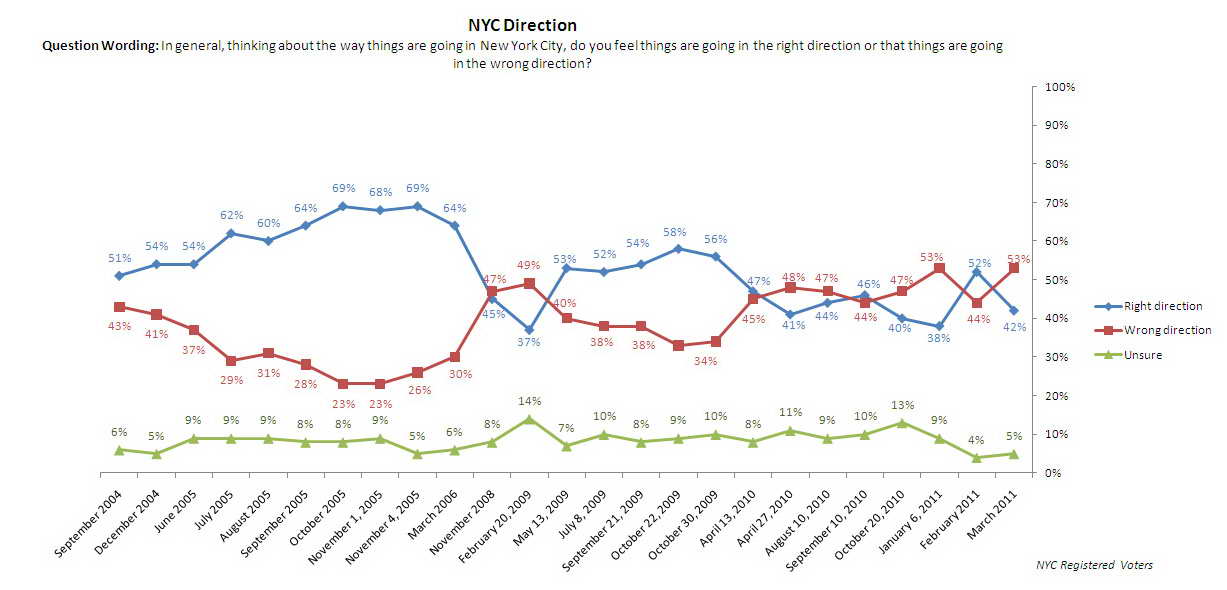March 31, 2011
3/31: Bloomberg Approval Rating at 40%
NY1/Marist New York City Poll
The high approval ratings once enjoyed by New York City Mayor Michael Bloomberg are, for now, a thing of the past. According to this NY1-Marist Poll, Mayor Bloomberg’s job approval rating among registered voters citywide is 40%. This includes 9% who believe the mayor is doing an excellent job in office and 31% who say he is doing a good one. About four in ten voters — 38% — rate Bloomberg’s job performance as fair while 21% view it as poor. Only 1% is unsure.
Click Here for Complete March 31, 2011 NYC NY1-Marist Poll Release and Tables
When NY1-Marist last reported voters’ opinions toward Bloomberg’s job performance in February, 44% of voters gave the mayor above average marks, 29% thought Bloomberg was doing a fair job, and 26% thought his performance was poor. One percent, at the time, was unsure.
“Mayor Bloomberg is not immune from ‘third term-itis,'” says Dr. Lee M. Miringoff, Director of the Marist College Institute for Public Opinion. “If you mix together the rough winter weather, a sluggish economy, and the ongoing battle over public schools, he’s spending too much of his political capital.”
Mayor Bloomberg’s approval rating has dropped in Queens and Staten Island. Currently, 35% of voters in Queens and Staten Island think Bloomberg is doing either an excellent or good job in office compared with 49% who thought the same in early February. The mayor’s approval rating is little changed in the Bronx and Brooklyn. 36% of voters in the Bronx and 35% of those in Brooklyn now approve of Bloomberg’s job performance. When NY1-Marist last reported this question in early February, the mayor’s approval rating stood at 38% in both boroughs. Bloomberg’s approval rating, though, has bumped up in Manhattan. 59% of registered voters in Manhattan currently give the mayor a thumbs-up compared with 50% in early February.
Table: Mayor Michael Bloomberg Approval Rating
Table: Mayor Michael Bloomberg Approval Rating Over Time
NYC Needs New Compass, Says Majority
A majority of voters citywide — 53% — believe the Big Apple is moving in the wrong direction while 42% think it is on the right track. Five percent are unsure. This is a turnaround from early February when a majority — 52% — said the city was traveling in the right direction and 44% said the city was heading in the wrong direction. Four percent, at the time, were unsure.
The change in attitude has occurred in each of the boroughs except for Manhattan. In the Bronx, 61% view the city as going in the wrong direction, a 22 percentage point increase from early February when 39% held this view. In Brooklyn, there has been a 12 percentage point increase on the positive side. Currently, 53% of these voters report the Big Apple is moving in the wrong direction compared with 41% in NY1-Marist’s previous poll. And, in Queens and Staten Island, 55% say the city needs to be redirected, up from 45% in early February. Opinions toward the city’s direction are little changed in Manhattan. 45% now view the city as moving along the wrong path compared with 47% previously.
Table: New York City Direction
Table: New York City Direction Over Time
Nearly Two-Thirds Fail Bloomberg on Schools
65% of registered voters in New York City disapprove of how Mayor Bloomberg is handling the city’s public schools while just 27% approve. Eight percent are unsure.
What a difference a third term makes. When Marist last asked this question in July 2009, a majority — 53% — approved of how Bloomberg was doing while 38% disapproved. Nine percent, then, were unsure.
67% of voters with children in the city’s public schools disapprove of how Bloomberg is handling the schools while 29% approve. Just 3% are unsure.
Table: Bloomberg on Public Schools
Bloomberg’s Handling of Schools: Is Control the Issue?
When it comes to laying off teachers, Mayor Bloomberg opposes “last in, first out.” However, is his desire to end tenure based more upon an attempt to gain greater control over the public schools or to close the city’s budget deficit? Half of New York City adults — 50% — think it’s a control issue while 38% say it’s for budgetary purposes. 12% are unsure.
Among parents with children in the New York City public schools, nearly six in ten — 57% — think Bloomberg wants this rule changed because he wants greater control over schools while 34% say it is based upon his desire to close the city’s budget deficit. Eight percent are unsure.
However, when asked if Bloomberg wants to change the rule of “last in, first out” to reduce the deficit or to weaken the teachers union, residents divide. 44% believe his rationale is budgetary while 43% say it is to weaken the union. 13% are unsure.
Half of parents with children in the public school system — 50% — cite the desire to weaken the unions while 40% say it is to close the deficit. 10% are unsure.
Table: Bloomberg’s Opposition to “Last In, First Out” — Budget or Control Issue?
Table: Bloomberg’s Opposition to “Last In, First Out” — Budget Issue or to Weaken Union?
Seniority Motivates Teachers Union, Says Majority
56% of New York City residents think teachers want to maintain the policy of “last in, first out” just to protect seniority while only 35% believe it is to keep the most experienced teachers in the classroom. Nine percent are unsure.
Among households with a union member, 62% think teachers are motivated by seniority while 31% believe their support is based more on their desire to retain the most experienced teachers. Seven percent are unsure.
Table: Teachers’ Support of “Last In, First Out” — Keeping Experienced Teachers or Seniority?
Budget Blues for Bloomberg
Mayor Bloomberg’s financial ability was at the core of his third term re-election campaign. However, voters view Bloomberg as falling short. A majority — 56% — disapprove of how Bloomberg is handling the city’s budget compared with 38% who approve. Six percent are unsure.
Views toward Bloomberg’s handling of the budget have steeply declined. When Marist reported this question in July 2009, 49% approved of his fiscal management while 41% disapproved. 10%, at the time, were unsure.
Table: Bloomberg on the City’s Budget
Bloomberg’s Legacy Status Quo
So, what does all of this mean for Mayor Bloomberg’s legacy? There has been little change. 39% of voters citywide say that Bloomberg will be remembered very positively. Included here are 10% who think that, when he leaves office, he will be viewed as one of the city’s best mayors and 29% who say he will be remembered as an above average mayor. 37% report Bloomberg’s legacy will be about average while 15% say he will be seen as a below average mayor. One in ten say Bloomberg will be considered one of the city’s worst mayors.
When NY1-Marist last reported this question in early January, similar proportions of voters shared these views.




